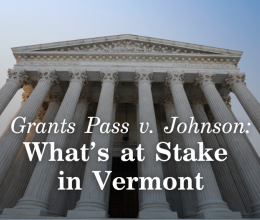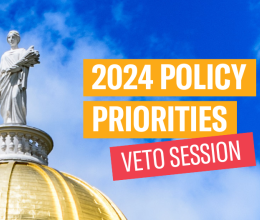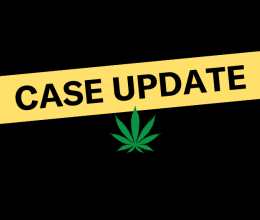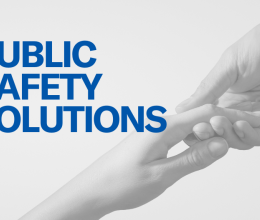
Our communities are grappling with the devastating impacts of Vermont’s growing opioid crisis, a record-breaking number of overdose deaths in 2022, and the abject failure of the decades-long “war on drugs.” We need a new approach to this worsening public health crisis—one that centers the dignity and humanity of our loved ones and neighbors, expands harm reduction infrastructure, decriminalizes drug use, and fosters meaningful investments in people and communities instead of policing and prisons.
Several bills are currently before the legislature that would enable Vermont to implement a public health approach to substance use—a framework that the U.S. Surgeon General urged communities to adopt in its 2016 Report on Alcohol, Drugs, and Health. This includes a pair of omnibus bills that advance a broad public health response to drug use (H.423 and S.119), an overdose prevention bill (H.222), and a bill that pushes the criminal legal system to adopt a harm-reduction response to drug use (H.72).
Sign our public health approach to drug use petition
Respond to people who use drugs with support and compassion, not handcuffs
Criminalization is an ineffective—and even counterproductive—strategy for addressing the complex neurobiological and social factors that contribute to substance use. Becoming involved in the justice system triggers a cascade of negative impacts on the lives of people who are arrested and their loved ones. By extension, the criminalization of personal drug use has been a driver of overincarceration and the damaging ripple effects it has on our communities.
The war on drugs has fueled mass incarceration for generations. This has been especially harmful for people of color. Between 2014 and 2019, Black people in Vermont were over 14 times more likely to be a defendant in a felony drug case compared to white people—despite the fact that Black and white people use and sell drugs at similar rates.
Furthermore, the criminalization of drug use increases stigmatization and drives substance use underground—making it less likely for people to seek or receive the care that they need and more likely to engage in unsafe practices that can lead to disease and death.
In addition to the human toll that criminalization and incarceration take on our communities, it is extraordinarily expensive to lock people in prison. The annual costs of incarcerating someone in Vermont is $95,000. By decriminalizing personal drug use, we can reduce our overreliance on incarceration and reinvest those savings into programs that actually serve our communities. This is why we hope the legislature will take up and pass H.423 and S.119 that would decriminalize the personal possession of drugs in Vermont.
Expand critical harm reduction infrastructure
Vermont has adopted an evidence-driven model to help people recover from substance use disorder through its hub-and-spoke program, but far more must be done to ensure that people who are struggling have access to the life-saving resources they need.
In addition to bolstering the existing substance use disorder treatment model, policymakers can and should ensure that people in every corner of our state have easy access to the overdose reversal medication naloxone, drug checking services and supplies, sterile safe injection devices and disposal boxes, transportation to treatment and support services, and mobile treatment solutions. H.222, an act relating to reducing overdoses, would help achieve some of these goals and we hope to see it pass this session. These policy initiatives—and others outlined in H.423, S.119, and H.72—could save lives and improve the health and safety of our communities.
Authorize overdose prevention centers
Overdose prevention centers are medicalized facilities where people can use opioids in a safe, non-judgmental space that offers on-site medical care. These facilities not only save lives—they also make our communities healthier, result in fewer discarded needles in public spaces, and reduce the transmission of HIV, Hepatitis C, and other blood-borne pathogens by giving people access to clean needles and disposal boxes. In creating a space where people who use drugs can interact with professionals, overdose prevention centers provide another low-barrier avenue for people to connect with long-term recovery programs. That is why we support H.72, a bill that would eliminate civil and criminal penalties for operating overdose prevention centers.
Learn more about overdose prevention centers
It’s time for meaningful, life-saving policy reform
A true public health response to drug use and addiction requires eliminating criminal penalties for possessing personal use amounts of regulated drugs. In doing so, the legislature would remove significant barriers to accessing care and support that drive negative health outcomes and overdose-related deaths. This would also reduce our unnecessary overreliance on incarceration, saving the state millions of dollars each year. Coupled with meaningful investments in harm reduction strategies that protect the health and safety of our communities and an increase in the availability of on-demand recovery services, bills like H.72, H.222, H.423, and S.119 will allow our state to make real progress towards addressing this growing public health crisis. Sign our petition and make your voice heard on this live-saving policy issue today.



